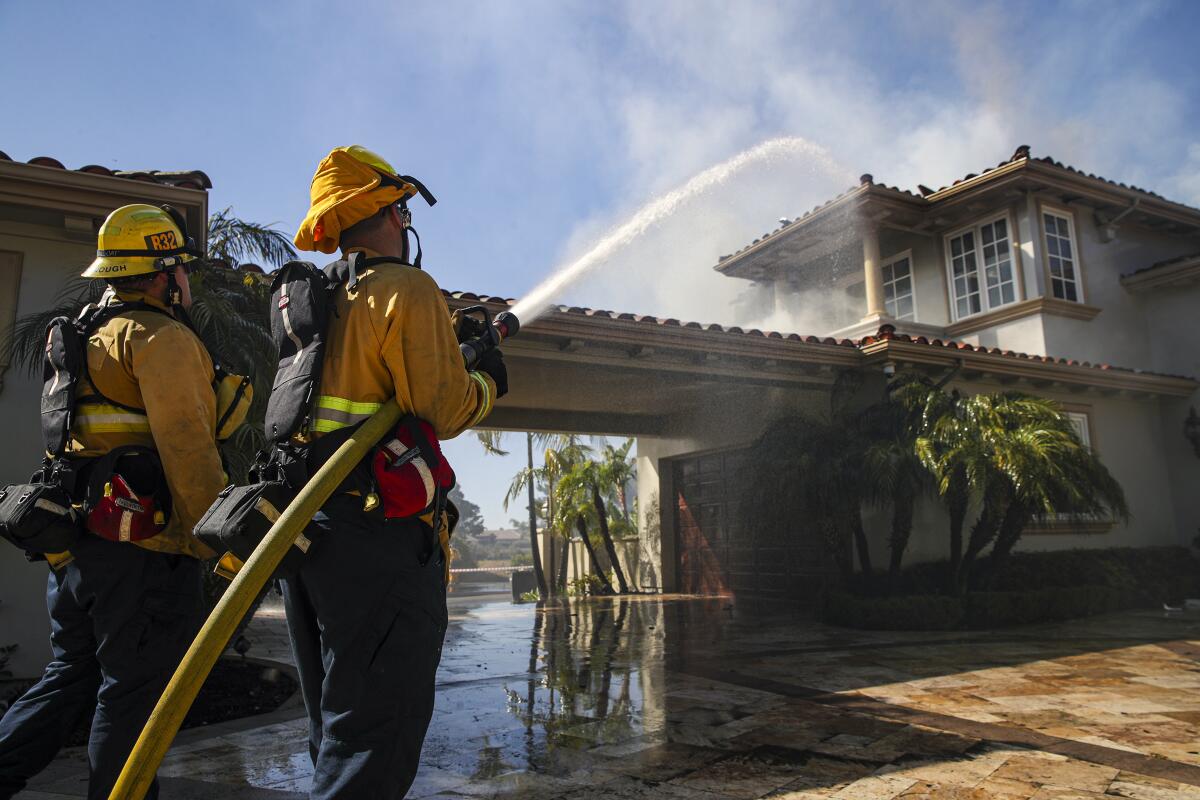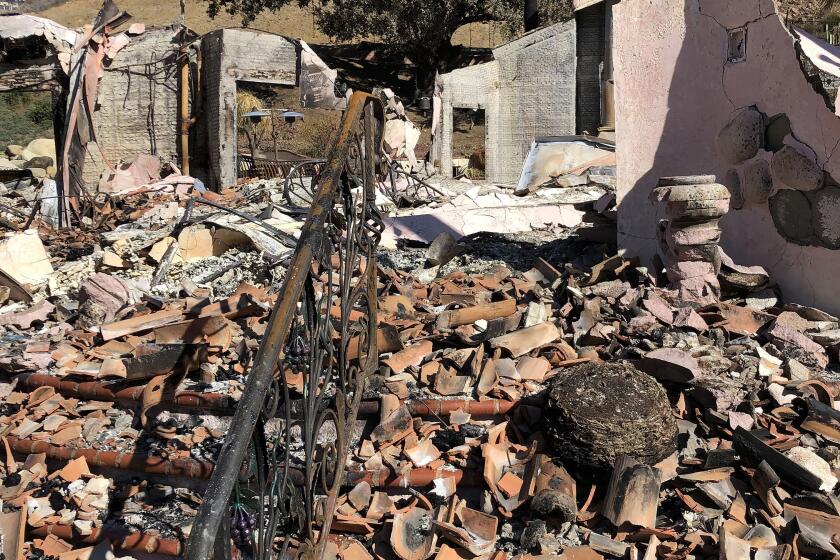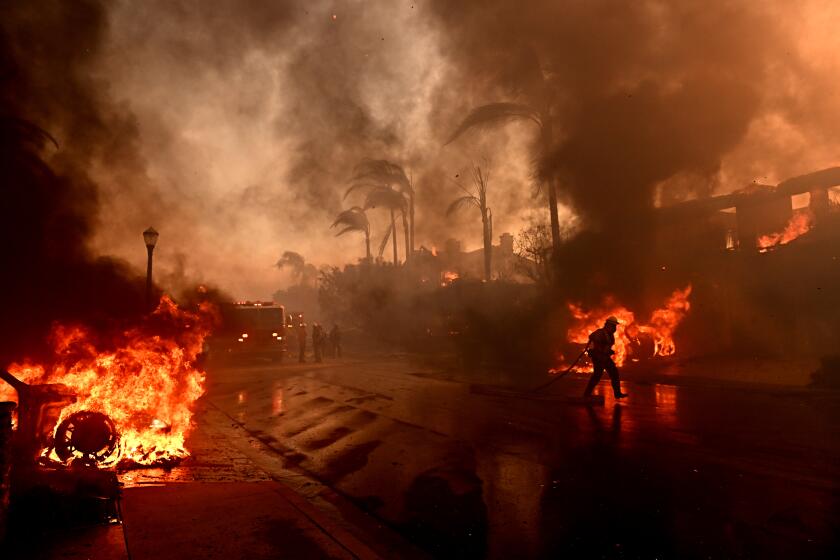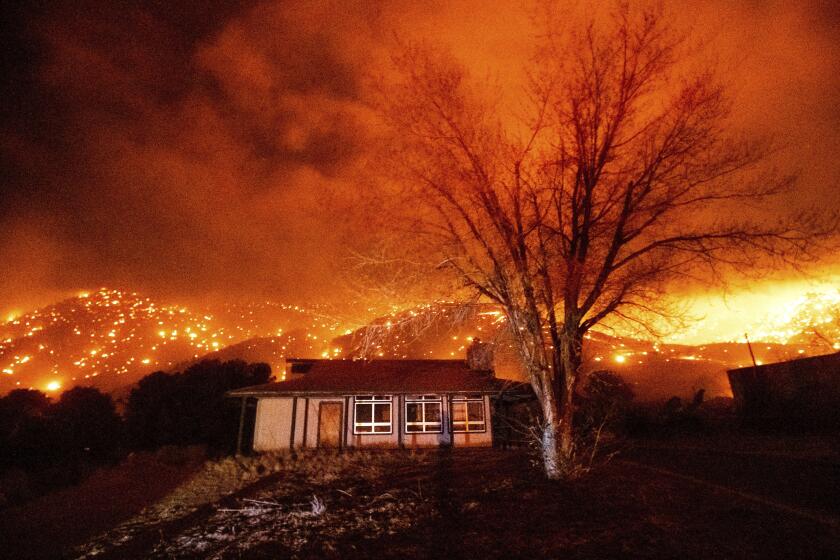Is your vacation rental in a risky wildfire zone? What you need to know

- Share via
Planning an idyllic vacation with your friends might include booking a vacation rental on a Malibu hillside with ocean views or surrounded by pines in Lake Tahoe.
As you prepare for your trip, Los Angeles Fire Department Deputy Chief Trevor Richmond wants wildfire safety to be on your checklist.
A Los Angeles Times analysis found that thousands of Airbnb rentals in California operate in areas with high levels of wildfire hazard, as identified by Cal Fire.
“During natural disasters, we send out emergency notifications to potentially impacted hosts and guests that include links to the most up-to-date guidance from local emergency management authorities so that they can prioritize their personal safety,” an Airbnb spokesperson said.
One in five California Airbnb short-term rental properties are in wildfire-prone areas, yet the company provides no warnings or evacuation information.
The company provides home safety workshops for Airbnb hosts. These workshops are meant to “encourage hosts to think carefully about their responsibilities and how to be a responsible host, including practicing fire safety by having a functioning smoke alarm, meeting government safety guidelines and regulations for their area, and more,” the spokesperson said.
However, Airbnb and other vacation rental platforms don’t regularly alert guests when a rental is in a wildfire zone, so you’re going to have to inform yourself.
Richmond said short-term renters need to be aware of how to reduce the dangers even when they’re in vacation mode.
Firefighters are “going to be hitting hard from the air; we’re going to be hitting hard from the ground. We’re going to be doing everything we can to slow the fire down,” Richmond said. “But we rely on the community’s help to pay attention, be smart and get out of the area quickly.”
So here’s how you can research the potential for disaster and what to do if it strikes next time you’re staying in a vacation rental.
Where is your rental?
To determine whether a vacation rental is in a fire hazard zone, check the property’s location on Cal Fire‘s state fire hazard severity zone map.
The Office of the State Fire Marshall created a fire severity zone map in 2007. It determines the severity of the fire hazard in each zone. A key factor is how close homes are to wilderness prone to burn.
Enter an address or city into Cal Fire’s map to see whether a property is in a very high, high or moderate zone.
On the Airbnb website, the address of a listing typically isn’t disclosed until after the reservation is confirmed. But the general location of a listing is shared on a map, so you can use that.
Track wildfire origins, perimeters and air pollution with the L.A. Times California wildfires map.
At your vacation rental
When you arrive, look around the outside and note whether brush or other plants are close to the home or hanging over a roof or chimney. Weeds and grass shouldn’t be higher than three inches. That’s not to say you need to start whacking weeds or clearing brush during your vacation, but your awareness could be useful if a fire breaks out nearby.
And if one does, Richmond said, move flammable patio furniture inside a garage or far away from the home. If the host left a stack of fire wood next to the home, place it a distance away.
In general, ask yourself if there’s anything near the building that’s flammable. If so, get it as far away as possible.
“A fire is not going to make a distinction between a Manzanita plant, or grass and patio furniture,” Richmond said. “If it burns, it burns.”
The wind has been one factor in the spread, and the size of the homes has also made containing the blaze difficult, officials said.
When do wildfires happen?
Last year, the Times reported that record-dry levels of vegetation during the summer months was a common factor in many of 2021’s largest blazes. Dry vegetation, caused by long-term drought and shorter-term heat waves, is making it easy for fires to ignite and spread at any time of year.
But September, October and November, in particular, are months when brush and other fuels have dried out after a hot summer and Santa Anas or other dry, hot winds create conditions for fires to grow out of control.
“We don’t have technically fire season because brush fire can burn at any time, but we do have certain times of the year where [we have a] heightened sense of awareness because we know fires can get big very quickly,” Richmond said.
Vacation renters should be on alert when there’s a combination of hot, dry and windy weather.
Drought, climate change and an early start to fire season mean this fall could be one of fire, smoke, poor air quality and evacuations in Southern California. Here’s how you can prepare now.
Stay informed and get notified
If you’re staying in the Los Angeles area, you can download apps and sign up for evacuation warnings and orders. Note that a warning means you should get ready to evacuate and an order means leave immediately. Here are a few:
- Alert L.A. County: Register your phone number or email address on the county’s website to receive alerts on emergencies or disasters across the county from the Sheriff’s Department.
- Notify L.A.: Register your phone number or email through the city of L.A.’s website to receive public health notices, evacuation orders and early warnings by phone, email, or text message.
- Nixle: Sign up to receive texts and phone calls from local law enforcement agencies throughout L.A. County.
- Pay attention to the local news to stay updated, Richmond said. The L.A. Times maintains a regularly updated map of fires in California.
According to a Times analysis, certain cities have rules that require Airbnb hosts to alert guests of the potential of a wildfire or other safety concerns.
For example, Los Angeles’ home sharing ordinance says a host whose listing is in the highest fire hazard zone must post in its listing and on site that outdoor smoking is prohibited. Another example is Malibu, where hosts are required to post a code of conduct in rental units, notifying guests of the city’s proximity to a fire hazard area, the listing’s evacuation zone, and the city’s website for evacuation info.
If there’s a need to evacuate, the county and city that are home to your rental will have evacuation plans or safety protocols. For example Los Angeles County activates its L.A. County emergency website when two or more county departments are responding to an emergency incident that poses a threat to life, property or the environment. The site has evacuations, human shelters, animal shelters, health alerts, road closures and media releases. You can also access evacuation information for Los Angeles County by dialing 211.
In an evacuation, anticipate that there will be traffic, and give yourself enough time to get out.
Richmond said the Oakland Hills fire of 1991 is an example of people waiting too long to flee. Twenty-five people died in that fire — at the time the worst in California history. In one instance, someone stopped her car and got out to walk, Richmond said, leaving people behind her with no way to get down the hill.
State fire, insurance and emergency response officials release guidelines for keeping your home safer from wildfires.
About The Times Utility Journalism Team
This article is from The Times’ Utility Journalism Team. Our mission is to be essential to the lives of Southern Californians by publishing information that solves problems, answers questions and helps with decision making. We serve audiences in and around Los Angeles — including current Times subscribers and diverse communities that haven’t historically had their needs met by our coverage.
How can we be useful to you and your community? Email utility (at) latimes.com or one of our journalists: Jon Healey, Ada Tseng, Jessica Roy and Karen Garcia.











